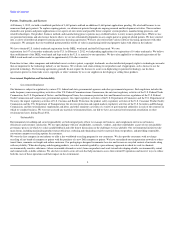Dell 2011 Annual Report Download - page 19
Download and view the complete annual report
Please find page 19 of the 2011 Dell annual report below. You can navigate through the pages in the report by either clicking on the pages listed below, or by using the keyword search tool below to find specific information within the annual report.
Table of Contents
extreme volatility and disruption from time to time in the future, which could result in higher credit spreads in such markets and higher funding costs for us.
Deterioration in our business performance, a credit rating downgrade, volatility in the securitization markets, changes in financial services regulation, or
adverse changes in the economy could lead to reductions in debt availability and could limit our ability to continue asset securitizations or other financings
from debt or capital sources, reduce the amount of financing receivables that we originate, or negatively affect the costs or terms on which we may be able to
obtain capital. Any of these developments could unfavorably affect our net revenue, profitability, and cash flows.
Developments in the European Union could have significant repercussions for the U.S. and international debt and capital markets. The current
macroeconomic climate and related disruption of the financial markets have led to concerns over the solvency of certain European Union member states and
of financial institutions that have significant direct or indirect exposure to debt issued by those countries. Certain of the major credit rating agencies have
downgraded the sovereign debt of some of the European Union member states. The ratings downgrades and uncertainty regarding the effectiveness of the
European Union and private sector actions to address such negative developments have increased concerns that other European Union member states could
experience similar financial troubles.
•Weak economic conditions and additional regulation could harm our financial services activities.
Our financial services activities are negatively affected by an adverse economic environment through related loan delinquencies and defaults. Although loan
delinquencies and defaults have improved from higher levels in recent periods, an increase in defaults would result in greater net credit losses, which may
require us to increase our reserves for customer receivables in the future. In addition, the implementation of new financial services regulation, or the
application of existing financial services regulation in new countries where we expand our financial services activities and related supporting activities, could
unfavorably impact the profitability and cash flows of our consumer financing activities.
•We are subject to counterparty default risks.
We have numerous arrangements with financial institutions that include cash and investment deposits, interest rate swap contracts, foreign currency option
contracts, and forward contracts. As a result, we are subject to the risk that the counterparty to one or more of these arrangements will default, either
voluntarily or involuntarily, on its performance under the terms of the arrangement. In times of market distress, a counterparty may default rapidly and
without notice to us, and we may be unable to take action to cover our exposure, either because we lack the contractual ability or because market conditions
make it difficult to take effective action. If one of our counterparties becomes insolvent or files for bankruptcy, our ability eventually to recover any losses
suffered as a result of that counterparty's default may be limited by the liquidity of the counterparty or the applicable legal regime governing the bankruptcy
proceeding. In the event of such default, we could incur significant losses, which could harm our business and negatively impact our results of operations and
financial condition.
•The exercise by customers of certain rights under our services contracts, or our failure to perform as we anticipate at the time we enter services
contracts, could adversely affect our revenue and profitability.
Many of our services contracts allow the customer to take the following actions that may adversely affect our revenue and profitability:
• Terminate the contract if our performance does not meet specified service levels
• Look to a benchmarker's opinion of market rates in order to request a rate reduction or alternatively terminate the contract
• Reduce the customer's use of our services and, as a result, reduce our fees
• Terminate the contract early upon payment of an agreed fee
In addition, we estimate our costs to deliver the services at the outset of the contract. If we fail to estimate accurately, our actual costs may significantly
exceed our estimates, even for a time and materials contract, and we may incur losses on the services contracts.
•Loss of government contracts could harm our business.
Contracts with the U.S. federal, state, and local governments and foreign governments are subject to future funding that may affect the extension or
termination of programs and are subject to the right of governments to terminate for
17
























